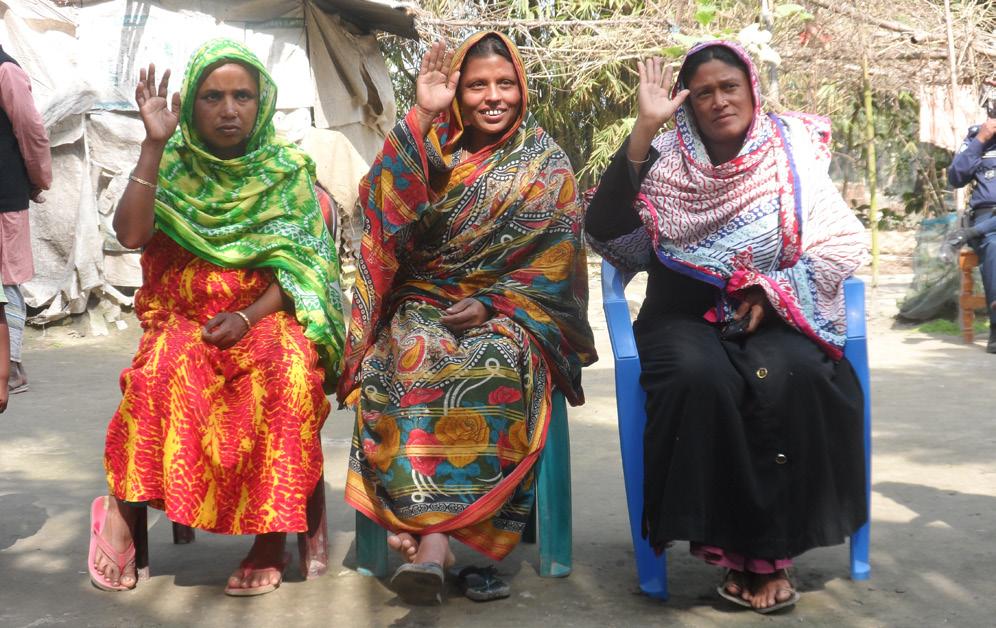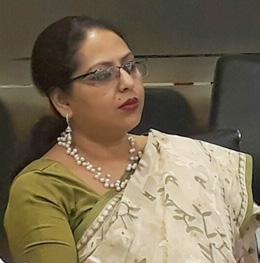
3 minute read
Ritu: the partnership
the partnership

Advertisement
The Ritu programme is funded by the Dutch Embassy in Dhaka, Bangladesh as part of their broader Sexual and Reproductive Health and Rights (SRHR) programme. In addition to the initial programme funding (November 2015–July 2019), the embassy funded an extension of the programme (August 2019–March 2020). The embassy has been involved in the development and implementation of the programme.
Consortium partners
The Ritu consortium consists of Simavi, RedOrange, and TNO. The Ritu programme was designed and implemented by the Ritu consortium in close collaboration with Bangladesh Nari Progati Sangha (BNPS), Development Organisation of the Rural
Poor (DORP), Impact Centre Erasmus. Maastricht
University and Johns Hopkins University were our partners in the Ritu study (RCT).
Simavi (consortium lead) is a Dutch NGO that strives for a world in which all women and girls are socially and economically empowered to pursue their rights to a healthy life, free from discrimination, coercion, and violence. Simavi specifically focuses on the nexus between WASH and SRHR, and is an expert on menstrual health programming. www.simavi.nl
Main roles in the programme are coordination, local and national advocacy, establishment of the MHM Platform, menstrual health, WASH and
SRHR expertise, quality control, monitoring, evaluation and learning from direct interventions in Netrokona and national advocacy, guidance from BNPS, and DORP.
RedOrange (consortium member) are an international consultancy in communication for change. As a one-stop solution house, RedOrange design and implement social and behaviour change projects, and provide innovative marketing,

Mrs Mushfiqua Satiar, Senior Policy Advisor SRHR and Gender, Dutch Embassy, Dhaka Menstruation is a topic that is considered as ‘taboo’ and used to not openly talked about in Bangladesh. As a result, many girls lack the necessary knowledge and information to care for themselves during menstruation. Furthermore, social and cultural norms and practices limit girls participation during menstruation. This hampers the 50% of the total population, that is the girls and women, becoming productive citizens and contribute to the development and progress of the country. Exactly this is the reason that in 2015 the Dutch Embassy in Bangladesh decided to invest in the Ritu programme. Ritu, in Bangla meaning season, used as name of a girl and also for menstruation. The programme has provided knowledge and opportunities for girls and women to access services and receive support of the society to overcome all obstacles around mensuration. We are assured that the results and learnings of the Ritu programme will inform and inspire programmes and policy makers to systematically invest in improving menstrual health in Bangladesh and we all contribute equally in the progress of our country. media, communications, and ICT support geared towards public, private, and social sector development. www.redorangecom.com
Main roles in the programme are development and implementation of the communication strategy, which includes advocacy and awareness-raising campaigns on local and national levels.
TNO (consortium member), a Dutch research and innovation institute, ‘connects people and knowledge to create innovations that boost the competitive strength of industry and the well-being of society in a sustainable way.’ www.tno.nl
Main roles in the programme are the development of a biodegradable sanitary pad in collaboration with the private sector for production of the pads.
Implementing partners
BNPS is an NGO and implementing partner of Simavi. It is an activist women’s organisation founded in 1986, working to establish equality for women in Bangladesh. Roles: local and national advocacy, and educational interventions in
Netrokona. www.bnps.org
DORP is also an NGO and implementing partner of Simavi. It develops and promotes sustainable models of capacity strengthening to facilitate access to necessary inputs of (mainly) women and children in marginalised communities. Roles: local and national advocacy, water, sanitation, and hygiene interventions in Netrokona. www.dorpbd.org Research partners
Impact Centre Erasmus University, dr. Kellie
Liket and Jolijn van der Ploeg, partner of Simavi in the evidence-informed programme development.
Lidwien Sol, PhD candidate Maastricht University, partner of Simavi in the evaluation (randomised controlled trial) of the direct interventions in Netrokona. Role: independent lead researcher.
Dr Julie Hennegan, Johns Hopkins Bloomberg School of Public Health, who partnered with Simavi and Maastricht University and provided advice for the evaluation (randomised controlled trial), and survey measures.







